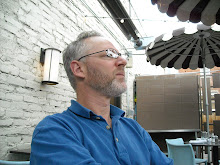Anyway I think bailout money should be used to do something similar with shopping centers. A mall with an empty storefront is a cancer to a community. Just as some cities hit particularly hard by the credit crunch have begun buying and repurposing residential real estate, I think the real estate community (guided by the not-invisible hand of government if need be) should consolidate malls by finding new homes for surviving tenants and demolishing the ghost malls. The properties should be turned into a new breed of park: one where public amenities like playgrounds and skateparks share space with small-scale commercial enterprises like ice cream sellers and sunglass kiosks. Permits to run these enterprises should be issued liberally, not restrictively. Indeed, they should be given away, not treated as a tax as is usually the case.
Under this plan, desperate investors get bailed out but instead of the money disappearing up Wall Street's a-hole, society receives tangible benefits to society: new parks and opportunities for entrepreneurs to start a life in business with very low startup costs. Public-private partnerships have already accomplished much bigger, more complicated deals, like my neighborhood and nearby Stapleton, the former civilian airport. If we think just a tad smaller, we could all benefit in a big way.

Not a bad idea per se, but how will this be funded? Please don't say taxes or deficit spending.
ReplyDeleteI would start with business improvement district fees and municipal bonds. I would also like to see financial-industry staffers who took "bailout bonuses" pool a meaningful amount of that money into a charitable endeavor. This could be it.
ReplyDelete